Wildlife Trafficking and the Novel Coronavirus
Air Date: Week of March 20, 2020
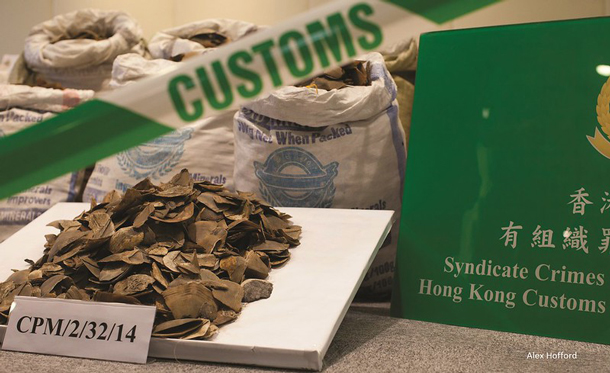
Illegally trafficked pangolin scales seized by the Hong Kong Customs & Excise Department (Photo: Alex Hofford, Flickr, CC BY-NC 2.0)
The illegal trade of protected species is a highly lucrative form of organized crime with deadly consequences. That’s because in addition to threatening ecosystems and inciting violence, wildlife trafficking plays a key role in spreading diseases including the novel coronavirus. Investigative journalist Lindsey Kennedy speaks with Host Steve Curwood to discuss the connections between wildlife trafficking, COVID-19 and other zoonotic diseases.
Transcript
[THEME]
CURWOOD: From PRX and the Jennifer and Ted Stanley Studios at the University of Massachusetts Boston, this is Living on Earth. I’m Steve Curwood.
The novel corona virus pandemic is calling attention once again to the illegal trade of endangered species. This latest virus likely jumped from bats to endangered pangolins and then to humans at a so-called wet market for bush meat in Wuhan, China. Three quarters of new human diseases come from animals, such as Ebola, SARS and HIV, and these are zoonotic diseases and wildlife trafficking plays a key role. It’s one of the most lucrative and devastating forms of organized crime and it has led to the dramatic decline of many species, including rhinos, elephants, and pangolins. Investigative journalist Lindsey Kennedy recently wrote about this for Foreign Policy magazine and joins us now from Glasgow, Scotland. Lindsey Kennedy, welcome to Living on Earth!
KENNEDY: Thank you very much. Thank you for having me.
CURWOOD: So why do you study zoonotic diseases?
KENNEDY: Well, I don't specifically study the diseases. I'm part of a journalistic collective. And I have spent the last two years my colleague Nathan Southern, looking into the wildlife trade in Southeast Asia. And I think a lot of people don't realize how big the wildlife trafficking trade is. It's one of the four biggest illegal trades in the world. It brings in about $26 billion a year. And most of that goes back to China. But the most trafficked mammal in the world is an animal called the pangolin. That kinda looks like a small scaly anteater. And about 10,000 of these are trafficked every year. So when we saw that carcasses of the pangolin, on their way into China, illegally being trafficked, had tested positive for the COVID-19 virus, we started thinking about whether or not this could have been something that triggered the outbreak. So we came at it from a wildlife perspective rather than a disease studies perspective.
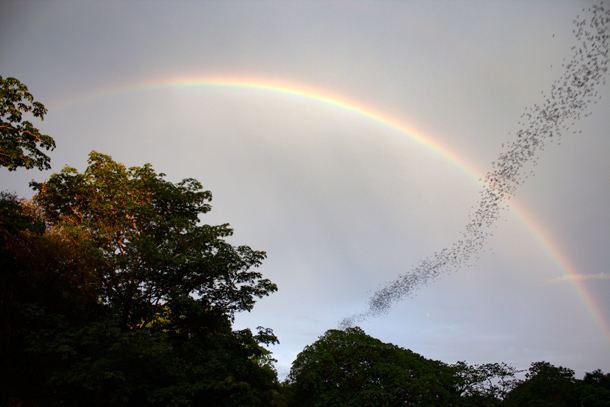
A colony of bats in Battambang, Northern Cambodia. Bats can carry many zoonotic diseases, including the coronavirus. (Photo: Lindsey Kennedy)
CURWOOD: So explain to me how the pangolin might be related to COVID-19.
KENNEDY: So when any kind of disease can jump from a species to another species or an animal to a human, that's called a zoonotic disease. And that's incredibly dangerous because our immune systems aren't prepared to deal with them. In the case of COVID-19, we know that came from wild animals. It's present in bats and pangolins, and snakes. We don't know exactly which of these animals were provided the link to humans; all of them are trafficked and sold within China. And we don't know exactly how that virus moved. But what we do know is that when you bring wild animals into contact with humans and livestock, you massively increase the risk of all these different diseases, jumping between species and going into the human population and just causing havoc.
CURWOOD: And remind us of other diseases that are zoonotic, that come from animals and jumped to humans.
KENNEDY: Well SARS is another one that originated in civet cats, actually, back in 2003 in China, and that was a very similar thingl that was wildlife being sold in markets and that's where it originated. Ebola is another one that comes from bats. Similar to COVID-19, again. There's just loads of them to be honest: Bird flu, swine flu, these are these are all zoonotic diseases.
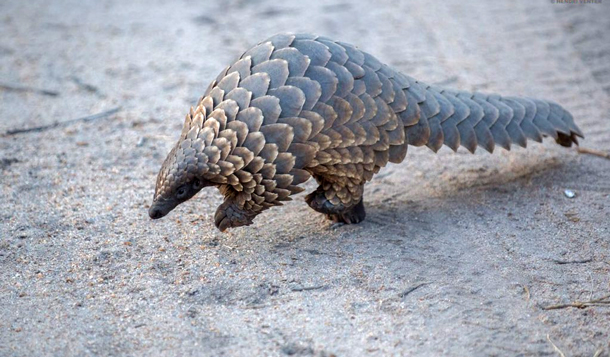
Pangolins are the most trafficked mammal in the world. It is thought that pangolins may have spread the coronavirus to humans. (Photo: Adam Tusk, Flickr, CC-BY 2.0)
CURWOOD: In fact, isn't HIV zoonotic?
KENNEDY: Yes, it is. Yeah.
CURWOOD: And to what extent are these diseases getting into the human population, because we're destroying habitat of these creatures and consuming more and more?
KENNEDY: It's definitely creating more and more risk all the time. Because the more you have deforestation, the more humans go further into the habitats of animals. And they're coming into contact with animals they haven't done so with before. And every creature on earth carries like millions of types of bacteria and virus. So every time you come into contact with a new animal, you just increase this risk massively. And epidemiologists have been saying for some time that the more contact we have with animals through deforestation, or by going into forests and bring animals back into our world and selling them and markets and that kind of thing, i t's been predicted for a while that there would be a pandemic. We just didn't know when it was going to happen. And now we're seeing it happen.
CURWOOD: Talk to me about About the markets where these animals are sold, I guess you call them wet markets. Well, what do they look like?
KENNEDY: Well, actually, it depends on where you are in the world because they're not just in China. But generally, if you just imagine like a big sprawling market where it's not necessarily the cleanest, but you've got lots of live animals squashed into small spaces in cages, different types of animals in small spaces, and sometimes you've got animals being sort of cut up and prepared for sale, even while you've got live animals still nearby. And if you just think about when meat is prepared in factories, how clean that has to be and how many processes an item goes through on a production line to make sure that a virus or a bacteria doesn't jump from one to another. And none of that is happening in a market, in a big wet market like that. Just people are walking around, they're touching different bits of meat. People are sneezing, animals are touching each other. It's just chaos, really, in terms of virus prevention.
CURWOOD: Not very appetizing, eh?
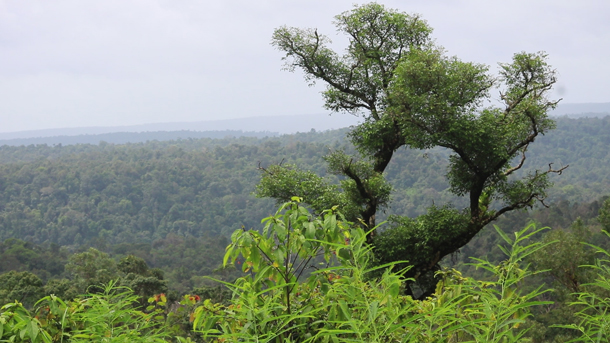
Koh Kong Conservation Corridor, home of the critically endangered Sunda Pangolin. (Photo: Lindsey Kennedy)
KENNEDY: No, not really.
CURWOOD: So why is it the people eat food, eat things, that are in these kind of conditions?
KENNEDY: In the case of China, actually most wildlife that's trafficked is done so for traditional Chinese medicine. So like the pangolin, the example I gave you before, that's an animal that's used in lots of different types of Chinese medicine; Also, its scales are using the production of meth. Parts of tiger and rhino are used in Chinese medicine. So that's why these kinds of products are brought in and sold in markets. But a lot of animals also sold just for meats, just because it's kind of a prestige thing to eat wild meat and a lot of the world.
CURWOOD: Indeed something I don't quite understand. But, you know,
KENNEDY: I can't say I do either to be honest.
CURWOOD: Different strokes for different folks. Now, what step has China and other countries taken in terms of regulating the wildlife trade, now that we've seen yet another instance of how deadly this can be for humans.
KENNEDY: It is illegal in China to import endangered animals. It has been for some time. There's a few problems with this. The big one is the fact that all efforts to kind of stop the trade have focused on prosecution haven't done anything to tackle demand at all over the years. And so the trade hasn't really reduced, because it doesn't matter how many poachers you send to prison. And it doesn't really matter how many busts of shipments coming into China you make. If people still want to buy those things, someone's going to find a way to get them in. And the thing about this particular scenario with the coronavirus outbreak is that a lot of conservationists are hoping that this is going to be more effective than any of that regulation because people will be put off eating it and they'll stop buying it in case they get sick. So hopefully this situation will actually be more effective than regulation has been in the past.
CURWOOD: What regulations has China put on it right now? Anything specific in the wake of the coronavirus outbreak?

The coronavirus originated in a Chinese wet market, where animals of all types are sold in close proximity. (Photo: Daniel Case, Wikimedia Commons, CC BY-SA)
KENNEDY: Yeah, there has been a ban put in on selling wildlife in the markets. They did the same thing after SARS, though. So it remains to be seen how long that lasts and whether it's just until it all blows over and then it comes back. So, again, if people want it enough, it'll come back; if people decide that actually it's not healthy for them, hopefully that will stop happening. I mean, the younger people in Southeast Asia and in China aren't as interested in eating and wildlife. They don't see it so much as like a social status. It's something sort of like the weird older people do. So hopefully, over time, as these people grow up, they'll maintain those attitudes; you have to hope.
CURWOOD: So, looking back, Lindsey, what did we learn from the response to SARS and that that had jumped from animals. And from that lesson, what can we do now to perhaps better prevent another outbreak?
KENNEDY: Um, I think with SARS, it was contained relatively quickly. And I'm not a clinician; I don't specialize in epidemics. But SARS was contained relatively quickly and I think we kind of got away with it. And for that reason, there wasn't a sea change. And people kind of forgot about it. They started doing the same things, buying the same animals after a little while, and think maybe it was seen as a bit of a one off. Whereas this time, I think, I don't think anyone realize how far this would spread. I mean, we've declared a global pandemic; it's, it's huge. I think that that has to leave lasting changes; that has to leave lasting attitudes towards eating wildlife and tracking wildlife this time.
CURWOOD: This highly lucrative traffic, and poaching and hunting and dangerous species goes on, as you say, at a very high level, there is a huge market. How can it be stopped? How could it be stopped?
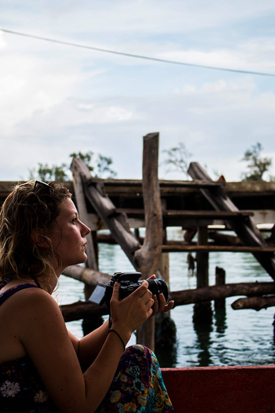
Lindsey Kennedy is an investigative journalist who has studied the wildlife trafficking trade in Southeast Asia. (Photo: Lindsey Kennedy)
KENNEDY: The only way you can stop the illegal wildlife trade is by reducing demand, everything else makes it worse. There's an amazing writer on conservation, Vanda Felbab Brown, who uses this example of being a bit like the drug trade, where let's say you're bringing in a massive shipment of cocaine into a country. You know that the border control is going to seize it's like 50% of that. So you just get, you know, your producers to give you 50% more cocaine in the first place. And the problem is, is when you apply that to animals, like when you pass the wildlife trafficking trade, that's incredibly destructive, because if you kill another 50% of pangolins, or tigers, you might be punishing more people. But you're killing more animals as a result. So really, it has to be an education thing, where you persuade people not to buy it and you also need to remember that the people who are poaching are often incredibly dire situations or, you know, really poor areas where there are a few employment opportunities. So you have to treat it as a development issue as well and work with those people to provide better employment so that they're not tempted to go and poach something on spec, basically,
CURWOOD: What can the international community do to stop this? What has it done so far? And where are the deficits and the approach?
KENNEDY: One kind of more popular angle that's been floated a lot by people trying to fight the trade is to treat the wildlife trade as a serious organized crime problem. And sometimes a something that's used to fund terrorism. And to really push that angle because that attracts funding, right? That really gets government's attention. If you say this is a massive organized crime thing, and these people might be using it to fund terror as well, you know, grabs attention. But the problem is, is then you start reacting to it with police and with armies. And those things don't, again, they don't stop someone in China wanting some little old lady that wants to go and buy like her Chinese medicine stuff in China, it doesn't stop her. It doesn't stop the poacher in the Namibia, who wants to feed his family, it doesn't stop either of those things. So even though there's been loads more money thrown at this in recent years, and even though people are taking it very seriously, governments and taking it very seriously, they're kind of just going about it in the wrong way, and it's making it worse. I mean, it doesn't help that in the US, you know, a couple of years ago, Trump lifted the ban on importing elephant products, I mean, which I'm sure has nothing to do with the fact that his own sons a big trophy hunters abroad, which has, you know, helped to react against a lot of change has been made in people's opinions about whether it's appropriate to hunt animals. But as I say, they're really effective policies are the ones that work with local communities, help people to shift from poaching to sustainable tourism, and going and seeing the wildlife you know, going out and photographing wildlife instead of killing it and that kind of thing. They've been effective and educating people about why it's damaging to the environment and to themselves to eat wildlife. These are the effective things but not so much going in all guns blazing and arresting people.
CURWOOD: We're talking about covert 19 today and the understanding that this came to humans from animals that were being trafficked and sold in markets. But talk to me about the broad implications of wildlife trafficking.
KENNEDY: Yeah, we are losing species across the globe faster than at any other time since the dinosaurs. It is kind of an emergency, really the rate at which we're losing biodiversity. And that is driven by wildlife trafficking and deforestation. And that's just a tragedy in itself to lose that incredible wealth of ecology. But it is also a tragedy for the human societies that live in these areas in places like Indonesia. And when you look up the island of Borneo, communities have lived in the same way for hundreds of years. Some people will live on the fringes of forests, they hunt food in a way that is sustainable, or they fish or they're able to build their homes from trees in that area without doing serious damage. But when you have wholesale destruction of an area, you just completely disrupt all of the ways those people live and you push them further into poverty. And it's so it's just a tragedy kind of all across the board, really.
CURWOOD: Lindsey Kennedy, investigative reporter, thank you so much for taking time with us today.
KENNEDY: Thank you.
Links
Foreign Policy | “The Coronavirus Could Finally Kill the Wildlife Trade”
Living on Earth wants to hear from you!
Living on Earth
62 Calef Highway, Suite 212
Lee, NH 03861
Telephone: 617-287-4121
E-mail: comments@loe.org
Newsletter [Click here]
Donate to Living on Earth!
Living on Earth is an independent media program and relies entirely on contributions from listeners and institutions supporting public service. Please donate now to preserve an independent environmental voice.
NewsletterLiving on Earth offers a weekly delivery of the show's rundown to your mailbox. Sign up for our newsletter today!
 Sailors For The Sea: Be the change you want to sea.
Sailors For The Sea: Be the change you want to sea.
 The Grantham Foundation for the Protection of the Environment: Committed to protecting and improving the health of the global environment.
The Grantham Foundation for the Protection of the Environment: Committed to protecting and improving the health of the global environment.
 Contribute to Living on Earth and receive, as our gift to you, an archival print of one of Mark Seth Lender's extraordinary wildlife photographs. Follow the link to see Mark's current collection of photographs.
Contribute to Living on Earth and receive, as our gift to you, an archival print of one of Mark Seth Lender's extraordinary wildlife photographs. Follow the link to see Mark's current collection of photographs.
 Buy a signed copy of Mark Seth Lender's book Smeagull the Seagull & support Living on Earth
Buy a signed copy of Mark Seth Lender's book Smeagull the Seagull & support Living on Earth

